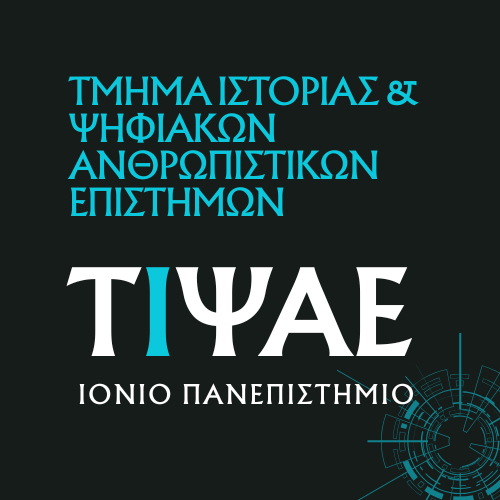MEDIEVAL WEST - WESTERN DOMINIONS
Teaching Staff: Baroutsos Fotios
Course Code: ΙΜΕ203
Course Type: Compulsory Elective
Course Level: Undergraduate
Course Language: Greek
Semester: 4th
ECTS: 5
E Class Page: https://opencourses.ionio.gr/courses/DHI211/
Curricula: Curriculum in History up to 2024-25, Curriculum in History and Digital Humanities from 2025
Between 1000 and 1300 A.D. western Europe was in a phase of growth and expansion, despite the crisis of the feudal system. The Crusades, born within the afore-mentioned frame, brought considerable changes, especially after the conquest of Constantinople in 1204.
Frankish states emerged in the eastern Mediterranean that gradually vanished, caught into the grinding conflicts caused by the unrealistic pursuits of the papacy. The aim of the lesson is to examine the presence and the survival, or not, of the western dominations in regard to: their bonds with the West, and the structure of the conquered local communities.
Special focus will be attributed to the Venetian presence in the eastern Mediterranean, the formation of its possessions in the Hellenic areas of the State of the Sea.
The case of Corfu will be examined thoroughly since it constitutes an outstanding example of interchange of western dominations from the late twelfth century to 1864.
The familiarization with the very meaning of Western dominations is the first goal. The second one is closely associated with the first, since the students will have to be aware of the historical context that caused the western dominations, the geopolitical and religious rivalries that is, and the emergence of the western European dynamism after the year 1000 A.D.
Of great importance in achieving the first two goals is to lucidly describe the structures of every domination, the social structure of the conquered communities, and the function of cultural exchange.
Finally, with the study of the long Venetian domination the students will have the chance to incorporate the experiential aspect of history into their perception of the historical past, given the fact that in Corfu the remains of at least three western dominations are visible. Walking around the town will be a useful history lesson.
Week 1 Political developments in Western Europe and the Crusades.
Week 2 The Great Schism, the anti-western current in Constantinople and the reaction of the Westerners. The Fourth Crusade and the Partitio Terrarum imperii Romaniae.
Week 3 The Frankish dominations.
Week 4 The feudal system, authority and society. The Assises de Romanie.
Week 5 Byzantium and Venice.
Week 6 The Venetian expansion in the eastern Mediterranean and northern Italy.
Week 7 (Virtual) Visit to the State Archives of Corfu.
Week 8 Venetian institutions and governance. The myth of Venice (16th century), crisis of political ideology (17th-18th centuries).
Week 9 The Venetian State of the Sea and the application of the Venetian republicanism.
Week 10 The social and political institutions of the conquered in the Hellenic areas of the State of the Sea.
Week 11 Presentations by students and debate.
Week 12 Presentations by students and debate.
Week 13 (Virtual) Historical walk in the town of Corfu.
- Σ. Ν. Ασωνίτης, Ο ελλαδικός χώρος στο μεσαιωνικό περίγυρο, Θεσσαλονίκη: Σταμούλης Αντώνιος, 2012.
- Π. Λοκ, Οι Φράγκοι στο Αιγαίο, Αθήνα: Ενάλιος, 1988.
- F. C. Lane, Βενετία η θαλασσοκράτειρα, Αθήνα: Αλεξάνδρεια, 2007.
- Μ. Δούρου-Ηλιοπούλου, Το Φραγκικό Πριγκιπάτο της Αχαΐας (1204-1432). Ιστορία. Οργάνωση. Κοινωνία, Θεσσαλονίκη: Εκδόσεις Βάνιας, 2005.
- Μαλτέζου, Χρύσα (επιμ.), Venetiae quasi alterum Byzantium. Όψεις της ιστορίας του βενετοκρατούμενου Ελληνισμού. Αρχειακά τεκμήρια, Αθήνα: Ίδρυμα Ελληνικού Πολιτισμού, 1993.
- Καραπιδάκης, Ν. E., «Από την ιστορία των πόλεων. Η διαμόρφωση της ομάδας των κερκυραίων πολιτών. ΙΕ΄-ΙΣΤ΄ αιώνες», Εώα & Εσπέρια1 (1993), 133-143
- Γάσπαρης Χ., Η γη και οι αγρότες στη μεσαιωνική Κρήτη, Αθήνα: Εθνικό ΄Ιδρυμα Ερευνών, Ινστιτούτο Βυζαντινών Ερευνών, 1997.
- Μαλτέζου Χ. (επιμ.), Πλούσιοι και φτωχοί στην κοινωνία της Ελληνολατινικής Ανατολής, Πρακτικά Διεθνούς Συμποσίου, Βενετία: Ελληνικό Ινστιτούτο Βυζαντινών και Μεταβυζαντινών Σπουδών Βενετίας, 1998.
- Λούντζης Ε., Περί της πολιτικής καταστάσεως της Επτανήσου επί Ενετών, Αθήνα: Καραβίας, 2000.
The seminar is comprised of lectures, presentations made by students followed by commenting and debate, a visit to the State Archives of Corfu, a historical walk in the town of Corfu.
Zoom teleconferencing
Open e-class platform
The assessment will be based on two exercises to be done during the semester. The final grade will be based on the sum of the performance in the two exercises.
Exercise 1
Study of a work of Cretan literature or the literatture of Eptanisos. The choice of work will be free.
Exercise 2
Examination on the subject matter of the course based on the lectures.
Back



